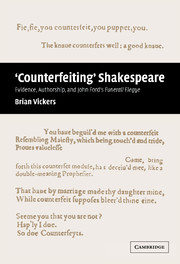Book contents
- Frontmatter
- Contents
- Preface
- List of tables
- List of abbreviations and note on references
- Prologue. Gary Taylor finds a poem
- PART I DONALD FOSTER'S ‘SHAKESPEAREAN’ CONSTRUCT
- PART II JOHN FORD'S ‘FUNERALL ELEGYE’
- 9 Ford's writing career: poet, moralist, playwright
- 10 Ford and the Elegye's ‘Shakespearean diction’
- 11 The Funerall Elegye in its Fordian context
- Epilogue. The politics of attribution
- APPENDICES
- Notes
- Bibliography
- Index
10 - Ford and the Elegye's ‘Shakespearean diction’
Published online by Cambridge University Press: 10 December 2009
- Frontmatter
- Contents
- Preface
- List of tables
- List of abbreviations and note on references
- Prologue. Gary Taylor finds a poem
- PART I DONALD FOSTER'S ‘SHAKESPEAREAN’ CONSTRUCT
- PART II JOHN FORD'S ‘FUNERALL ELEGYE’
- 9 Ford's writing career: poet, moralist, playwright
- 10 Ford and the Elegye's ‘Shakespearean diction’
- 11 The Funerall Elegye in its Fordian context
- Epilogue. The politics of attribution
- APPENDICES
- Notes
- Bibliography
- Index
Summary
Donald Foster, arguing Shakespeare's authorship of the Elegye, produced several lexical items which, he claimed, were unusual in that poem, but had been used by Shakespeare. As with other such claims, Foster did not pretend to have checked the whole of English Renaissance literature, but he occasionally cited evidence suggesting that he had performed some kind of search, and he definitely left the impression that the lexical items he identified could serve as reliable stylistic markers. In fact, many of them also occur in Ford's writings, in some cases just as frequently as in Shakespeare, or even more so.
I begin with the negative prefix un–, which occurs some twenty-eight times in the Elegye. As we saw in chapter 3, Foster claimed that the frequent use of words beginning with un– was a distinctly Shakespearian characteristic, such words amounting to 2.5 percent of his vocabulary. However, I showed that Foster, in making this claim, was ignorant of C. L. Barber's demonstration that un– was by far the most popular prefix in Early Modern English, amounting to 40 percent of the prefixes listed in his sampling of OED, and allowing the formation of many nonce-words. Modern linguistics would define it as an ‘open category’ word, for any user can invent new words of this form. As we briefly saw, Henry Chettle and Thomas Nashe coined many un– words – and so did John Ford. Our knowledge of Ford's linguistic habits was vastly extended by T. A.
- Type
- Chapter
- Information
- 'Counterfeiting' ShakespeareEvidence, Authorship and John Ford's Funerall Elegye, pp. 302 - 362Publisher: Cambridge University PressPrint publication year: 2002



